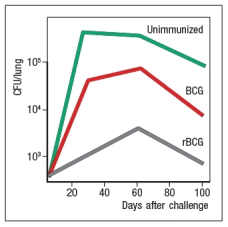Currently, the only licensed vaccine against Mycobacterium tuberculosis (Mtb) is the attenuated strain, related to Mtb, known as BCG. While BCG protects some populations against some strains of Mtb, an improved vaccine for this deadly disease is needed. One recent effort to generate a better vaccine against Mtb is to engineer BCG to have improved immunogenicity in vaccinated individuals. BCG, like Mtb, infects macrophages, replicating in the macrophage phagosomes. Both BCG and Mtb prevent phagosome acidification and fusion with lysozomes, thereby preventing macrophages from efficiently killing the ingested bacteria. In addition, antigens from the bacteria are not found in the macrophage cytosol. To alter this lifestyle, BCG was engineered to express the listeriolysin protein from Listeria monocytogenes. This enzyme lyses the phagosomal membrane allowing antigens to escape into the cytosol. In addition, a mutation was generated in this same BCG to inactivate the bacterial urease, an enzyme that prevents acidification of phagosomes carrying ingested bacteria. This modified BCG was called rBCG, for recombinant BCG. To test whether rBCG induced more potent protection than the original vaccine strain, mice were immunized with BCG or rBCG, or left unimmunized, and then challenged with virulent Mtb. Titers of Mtb (CFU/lung) were then examined over time after challenge, as shown in Figure Q25) .  Figure Q25) Based on these data, rBCG likely induced:
Figure Q25) Based on these data, rBCG likely induced:
A) Increased cytolytic CD8 T cells capable of killing Mtb-infected macrophages
B) Increased neutralizing antibody responses to Mtb
C) Increased numbers of CD4 TFH cells to Mtb peptides
D) Increased activation of NK cells capable of killing Mtb-infected macrophages
E) A decrease in the ability of Mtb to infect macrophages in the vaccinated mice
Correct Answer:
Verified
Q24: One clinical trial performed in the early
Q25: Autoimmune diseases are characterized by an
Q26: Studies in mice have revealed important features
Q27: Respiratory syncytial virus (RSV) is a common
Q28: Conjugate vaccines, such as those developed against
Q29: The US Department of Health and Human
Q31: One early study on DNA vaccines examined
Q32: Large clinical trials have been performed to
Q33: Safety concerns in the latter part of
Q34: Early efforts to develop a
Unlock this Answer For Free Now!
View this answer and more for free by performing one of the following actions

Scan the QR code to install the App and get 2 free unlocks

Unlock quizzes for free by uploading documents